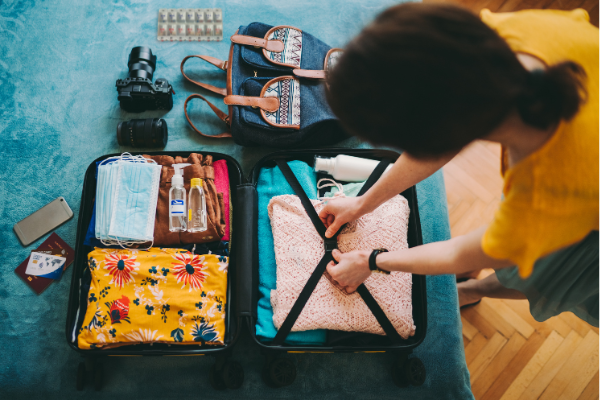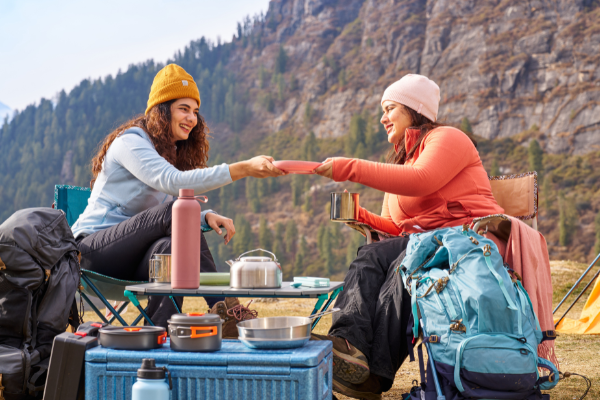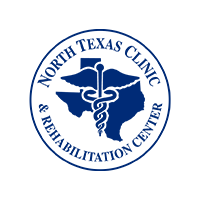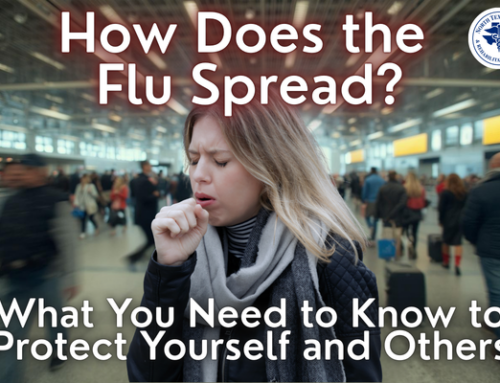Have you ever gotten sick on the second day of your long-awaited vacation? It happens to the best of us. Getting sick while you’re away from home can quickly ruin a great trip. But with these tips on how to stay healthy when traveling, you can hopefully avoid this vacation-ruining situation.
Whether you’re heading out for business, pleasure, or a mix of both, taking a few simple precautions can help you feel your best.
The first thing you need to know is general health advice for anybody, no matter where you’re going. Then, your destination will determine what else you should keep in mind to make sure you stay healthy when traveling.
General Tips for Healthy Traveling
These basic habits can help keep your immune system strong and your body feeling good, no matter your destination:
✅ Eat smart
Avoid skipping meals or relying only on convenience foods. Pack healthy snacks and opt for balanced meals that include protein, fiber, immune-boosting fruits and vegetables, and healthy fats whenever possible.
✅ Hydrate, hydrate, hydrate!
Traveling by car or plane can be dehydrating, and maintaining regular water intake is essential for supporting a strong immune system. Drink water regularly, and increase your intake in dry climates or during a lot of physical activity.
✅ Stay active
Make time to move your body. Do some quick stretching and mobility exercises before heading out each day to reduce soreness and keep you flexible. Then, look for opportunities to increase your physical activity, especially when you are sitting for extended periods. Do things like taking the stairs instead of elevators and walking instead of riding the subway.
✅ Protect your skin
Use SPF 30+ sunscreen every day (even in the car or on a plane!), wear protective clothing and sunglasses, and take breaks in the shade to avoid heat exhaustion and sunburn.
✅ Practice good hygiene
Wash your hands often and carry hand sanitizer for times when soap isn’t available. Avoid touching your face as much as possible. If you or a travel companion has a weakened immune system, consider wearing a face mask in crowded areas to reduce exposure to COVID, flu, RSV, and other contagious conditions.
✅ Get enough rest
Try to maintain a regular sleep schedule, especially if you’re changing time zones. Your immune system works better when you’re well-rested.

How to Stay Healthy When Traveling Within the U.S.
Even when traveling domestically, it’s vital to prepare your body and schedule to minimize health risks.
Pack a travel health kit — Include your medications, pain relievers, allergy meds, hand sanitizer, motion sickness relief, face masks, and a basic first aid kit—just in case.
Be mindful of food safety — While most food trucks and roadside diners prioritize food and health safety, it never hurts to do a little research. Check local health inspection reports or look for a displayed inspection certificate at the establishment before you sit down. Always ensure your meat is properly cooked, and observe how they handle food, when possible, to avoid foodborne illness.
Learn about your destination — If you’re doing research on safe places to eat anyway, you might as well do a bit more on your route and destination. Look up potential safety hazards, weather expectations, local clinics and pharmacies (just in case), and any other helpful information that will ensure you have the best experience.
Don’t ignore allergies — Whether you’re visiting a city or camping in the woods, seasonal allergies or food allergies can sneak up. Bring what you need to manage them so they don’t ruin your trip.

How to Stay Healthy When Traveling Internationally
Going abroad requires a few extra steps to protect your health. Here’s what to keep in mind:
Check vaccine recommendations — Visit your doctor or travel clinic at least a month before departure to learn everything you need to know about how to stay healthy when traveling to specific countries. Depending on your destination, you may need vaccinations for hepatitis, typhoid, yellow fever, or other diseases. It can also be helpful to ensure you’re up-to-date on vaccinations, such as for the flu and COVID, well before your trip, as you never know who you’ll be flying with.
Use caution with drinking water — Tragically, many countries don’t have clean, safe-to-drink water. Find out if your vacation spot has clean water before you leave. If they don’t, bring plenty of bottled water for drinking and brushing your teeth.
Know how to find care abroad — Travel insurance with medical coverage can be a lifesaver. Research nearby clinics or hospitals at your destination before you go.
Consider care for chronic conditions — Be sure to bring a sufficient supply of both regular and emergency medications because you may have trouble getting your prescriptions abroad. You may also consider wearing a Medical ID to help keep you safe in the event of a medical emergency. If you have food or environmental allergies, learn how to communicate them in the local language or carry a translated allergy card.
Manage jet lag — Start adjusting your sleep schedule a few days before you leave. Once you arrive, get sunlight during the day and avoid long naps to help your body reset.

Terrain-Specific Safety Tips
Different environments require different precautions, and knowing how to stay healthy when traveling is especially important in water or potentially dangerous climates. Here’s how to prepare for common travel settings:
🏖 Beach Travel
- Apply sunscreen often—even on cloudy days.
- Drink plenty of water, especially in the sun.
- Wear water shoes to protect your feet from sharp rocks or shells.
- Be cautious of rip currents and obey lifeguard flags and signs.
- Know the signs of drowning and consider CPR training before heading to the beach. Not all public beaches have lifeguards, and a scary situation can happen before a lifeguard notices anything in crowded areas. If you’re traveling with kids, it’s especially important to know how to handle emergencies yourself.
🏞 Hiking or Mountain Destinations

- Bring layered clothing to adjust for changing temperatures.
- Carry extra water and snacks.
- Let someone know your route if hiking or climbing alone.
- Watch for signs of altitude sickness (dizziness, nausea, headache) at higher elevations.
🏜 Desert Travel
- Hydration is critical—bring more water than you think you’ll need.
- Wear light-colored, loose clothing to stay cool.
- Plan outdoor activities during early morning or evening to avoid the hottest part of the day.
- Watch for signs of heat-related illness or dehydration, like lack of sweating, confusion, or dry mouth, and act quickly to prevent heatstroke.
Safe and Healthy Traveling
A little preparation goes a long way when it comes to knowing how to stay healthy when traveling.
Whether you’re trekking near or far, don’t wait until you’re sick to think about your health. Otherwise, it could ruin the whole trip.
Our clinic is here to help you get travel-ready with advice, check-ups, and vaccine recommendations before your exciting departure.
Have a healthy, safe, and joyful journey!





